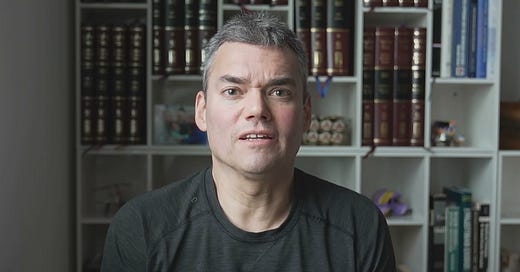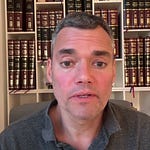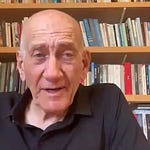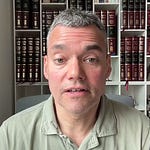Our Communal Leaders Keep Conflating Discomfort with Unsafety
There will be no Zoom call this Friday. We’ll resume on Friday, January 3 at 1 PM Eastern with a conversation with Paul O’Brien, Executive Director at Amnesty International USA, about Amnesty’s new report accusing Israel of committing genocide in Gaza.
I recorded a short interview (without a live audience) with Sarah Leah Whitson, Executive Director of DAWN, which promotes human rights in the Middle East, about their new lawsuit against the State Department for failing to enforce US human rights laws against Israel. I’ll post it this Friday in lieu of our live call.
Both Zoom calls are for paid subscribers.
My New Book
Knopf will publish my new book, Being Jewish After the Destruction of Gaza, on January 28 of next year. I hope the book will contribute, in some small way, to changing the conversation among Jews about what is being done in our name. But I’m keenly aware of two things: First, Jewish voices like mine usually get more attention in the US than do Palestinian ones. Second, while I’m publishing my book, Palestinians in Gaza— and beyond— are suffering in unspeakable ways.
So, while I hope you consider buying my book, I hope you also consider buying a book by a Palestinian author. I’m grateful to readers for offering their favorites. One reader recently recommended Naomi Shihab Nye’s young adult novel, Habibi, about Liyana, a Palestinian-American girl from St. Louis whose family returns to West Bank, a place she struggles to make home.
Readers have also suggested additional charities working in Gaza. One is Donkey Saddle, which “has been providing ongoing support for over 15 extended families” in Gaza.
Sources Cited in this Video
The New York Times story, the American Jewish organizations’ letter, and the National Association of Independent Schools’ (NAIS) apology, after two speakers at an NAIS conference condemned Israel’s war in Gaza.
Things to Read
(Maybe this should be obvious, but I link to articles and videos I find provocative and significant, not necessarily ones I entirely agree with.)
On the Jewish Currents podcast (subscribe!), a conversation about the intensified crackdown on pro-Palestinian activism likely when Trump takes power.
NPR’s This American Life talks to an eight-year-old girl in Gaza.
Rabbi Sharon Kleinbaum and Professor Sa’ed Atshan compose a “A queer prayer for nonviolence in Israel/Palestine.”
Viewer Response
With the viewer’s permission, I periodically publish emails that I receive about my weekly emails.
Last week, Suzan Greenberg, responded to my argument about why so many Americans—and American Jews—get so upset when Israel is accused of genocide.
“I understand and appreciate your argument about Jewish and Western exceptionalism. What surprised me, though, was that you made no mention of the legacy of the Holocaust and the use of the term "genocide" to refer to both what befell European Jewry and what is happening in Gaza. I am writing from a place of anti-occupation and pro-cease fire, and for that matter, I did not believe that Israel should have invaded Gaza post-October 7. Intellectually I agree that the definition of genocide encompasses what Israel has done and is doing in Gaza (and certainly there are members of Netanyahu's cabinet who have been fairly explicit about their goals).
But I am also married to a son of Holocaust survivors who endured the camps and the Warsaw ghetto uprising and who lost scores of their closest relatives - parents, siblings, nieces, nephews, aunts, uncles, etc. - and I recognize in him a gut-level resistance to applying the term genocide equally to what happened to his family and to what is happening in Gaza. He cannot accept that equivalence, and I think that many others in the Jewish community, including many Jews who do not have the same family history, feel similarly. And although I do agree that what Israel is doing is, by definition, genocide, I find myself recoiling - despite myself - from the term as well.”
See you on Friday, Jan 3,
Peter
VIDEO TRANSCRIPT:
So, something happened earlier this month in December that might seem like—given the scale of all the magnitude of the horrors that are happening around Palestine and Israel—might not seem so significant, but I think really is emblematic of something that’s gone terribly, terribly wrong in the organized American Jewish community.
So, there was a conference for private schools, American private schools, around diversity and the needs of people of color. And a lot of schools sent administrators to this conference. And at this conference, there was an Arab American doctor who spoke and also an African-American sociologist from Princeton. And they said that Israel was committing genocide in Gaza. And one of them said that Israel was racist.
So, in response, evidently, a number of students who were attending from a Jewish school said that they felt threatened. And they took their Stars of David, evidently, and they kind of tucked them into their shirts. And then afterwards, the Anti-Defamation League, the American Jewish Committee, the Jewish Federations of North America, they sent this letter demanding an apology and saying that speakers like this should never be allowed to speak at a conference like this again and saying that the Jewish students had been made to feel unsafe.
Now, I don’t see what’s wrong on the surface—if you’re talking about a conference on issues related to people of color and discrimination against them—to talk about Palestinians, right, and their experience. Palestinians are people of color, and they face a tremendous amount of racism and discrimination in the United States, even though we don’t really have a language to discuss it much because there’s almost no word for anti-Palestinian racism. But it’s very ubiquitous if you just think about how frequently it is that it is assumed that Palestinians should live without equality. And then, of course, Palestinians in Israel-Palestine live in a state that even Israel’s own leading human rights organizations have called an apartheid state, and now in Gaza are suffering what even some of the world’s most prominent Holocaust historians, like Israeli-born Omer Bartov, call a genocide.
But putting that aside, what’s so profoundly disturbing about this response is the idea that Jewish students are made unsafe when Palestinians or other people talk about what Israel is doing to Palestinians. And there’s a terrible, terrible irony here, right. Because for years and years and years, it’s people on the political right in the United States, including prominent commentators on the American Jewish right, who have talked about the fact that people should not be fragile, that people should be able to listen to difficult conversations. They shouldn’t be ‘snowflakes’ who need safe spaces, that the point of education is about listening to points of view that you disagree with, ones that may make you even really uncomfortable, but that’s what education is about. How many times have we been told that when Black students or LGBT students or other students have basically expressed discontent about things that they have heard.
And now, you have this situation where because a group of Jewish students hear someone accusing Israel of genocide or saying that Israel is racist, America’s most prominent Jewish organizations say that these speakers must apologize, the organization must apologize because the students have been made unsafe. There’s nothing about saying that Israel is committing genocide or that Israel is acting in a racist way that makes Jewish students unsafe. The people who should be apologizing are the Jewish educators who have taught young American Jewish students to feel that their safety is at risk when people talk about what is happening to Palestinians.
Of course, if people actually, physically threaten or intimidate Jewish students on any campus, that’s absolutely unacceptable. But there is a profound difference between physically intimidating or threatening students and simply talking about what’s happening to Palestinians. And yet, so frequently in Jewish spaces, the message that we send and the message we send young people—and I am the parent of students who went through Jewish schools—that the message that we send is if Palestinians talk about their experience vis-a-vis the state of Israel, you should take that as a threat and therefore people can try on behalf of you in the name of your safety to shut that speech down, which is the opposite of education. It’s the opposite of what schools should be doing.
And this incident, although it might seem like a small incident, is so emblematic of, I would say, the crisis of education that we face inside the organized American Jewish community, in which rather than actually try to train students to listen to difficult truths about the state of Israel and painful truths about the way Palestinians live under Israeli control, we actually try to use tactics of bullying and intimidation to shut those conversations down. And we say it’s in the name of Jewish safety. It’s not about Jewish safety. Jewish safety is a cloak in an effort to prevent honest conversations and to keep young Jews ignorant, which is not good for us as a community and not good for our next generation.











Share this post